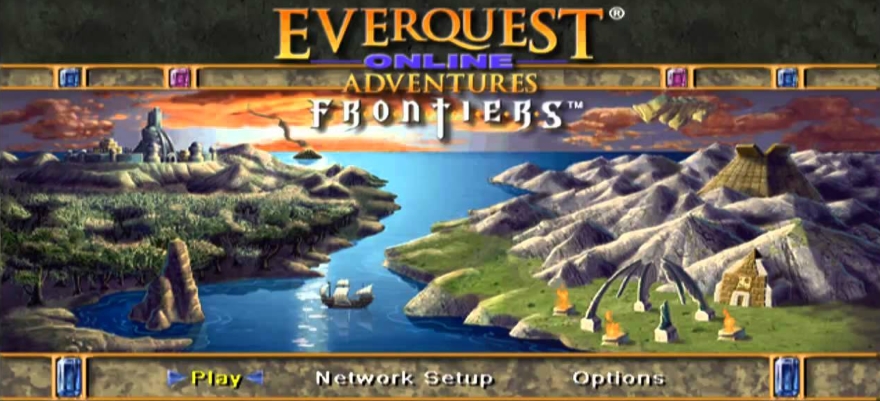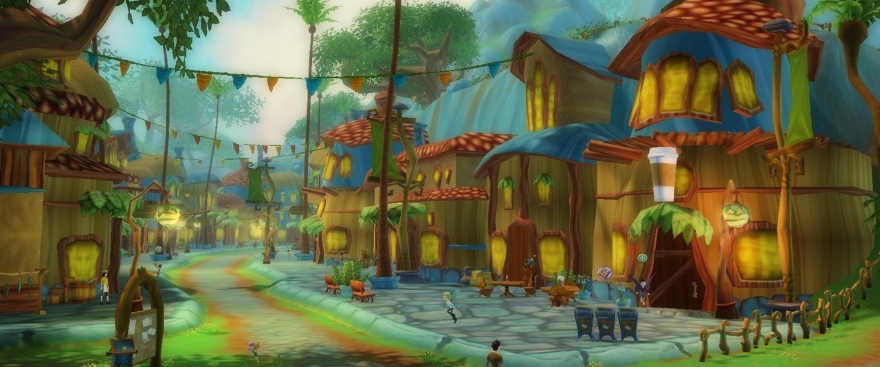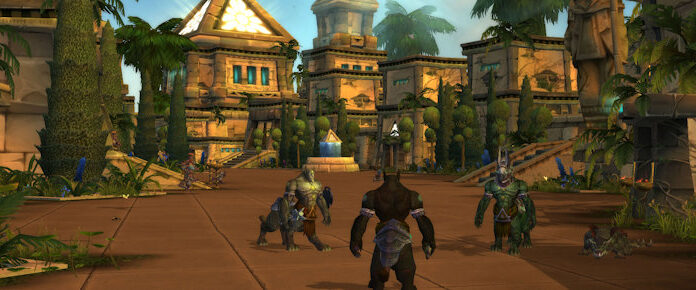
It used to be that hunting for a console MMORPG was one of the most fruitless endeavors known to gamers. The PC was where it was at, dating all the way back to the birth of MUDs back in the 1980s. For decades, console gamers could only look on in envy as their PC comrades enjoyed persistent worlds, massive multiplayer, and online events.
The scene, of course, has radically changed, particularly over the past five years. Now studios are downright eager to tap into the console market with their online titles, and in some cases these MMOs have proven to be much more successful on those platforms than their PC version counterparts.
While a full list of every console MMO to date would far exceed a top 10 list, I thought it was worthy of drawing out the most notable titles that have existed to date on video game consoles. Some of these are long extinguished, some are famous disappintments, while others are flourishing even today. What would you pick for this list? Let us know in the comments!
1. Phantasy Star Online
“In the end, we decided that everything will be tied together into a common goal,” said Sonic Team Lead Yuji Naka.
Coming out on the Dreamcast in Japan in 2000, Phantasy Star Online took the first timid steps toward true MMOdom with online connectivity (via dial-up modems) and a lobby-based dungeon crawler. Drawing off of the popular Sega RPG series, PSO achieved modest success across many consoles (including the GameCube and Xbox), regions (including North America and Europe), and iterations. The game’s population peaked with an impressive 600,000 in 2003, and its remaining console versions closed up shop in 2008.
Phantasy Star Online spawned several versions, a spin-off (Phantasy Star Universe), and a sequel (Phantasy Star Online 2) that western players have been hoping will make the jump across the Pacific.
2. EverQuest Online Adventures
Prior to World of Warcraft’s 2004 launch, EverQuest was the king of the MMORPG hill for a good half-decade. SOE decided to see if it could duplicate some of the success of the PC game by adapting the fantasy title to the PlayStation 2 in 2003. EverQuest Online Adventures was technically a prequel to the main MMO, offering console players a stripped-down experience in Norrath that didn’t require the use of a console hard drive. A single expansion pack, Frontiers, came out later that year, and EQOA gamely struggled along for nearly a decade before SOE shuttered it in 2012 due to the console’s age and the diminutive population.
3. Final Fantasy XI
With its 11th installment of the main series, Final Fantasy jumped into the world of online gaming even as that market existed in a tumultuous state. Final Fantasy XI debuted in 2002 on PC and the PlayStation 2, followed by an Xbox 360 release some time thereafter. It had the distinction of pioneering the way for cross-platform play, a first for MMOs.
FFXI enjoyed a long and healthy run, racking up a half-million playerbase by 2008 and five full-fledged expansions. Currently the title is just days away from shutting down its console service on March 31st, although the PC edition will endure in maintenance mode. A mobile version of the game is reportedly in development as well.
4. Free Realms
Failed experiment or underappreciated classic? SOE’s vivacious kid-friendly Free Realms could legitimately fall under both categories and more besides. Coming out in 2009 for the PC, Free Realms was the studio’s attempt to create a title for the entire family and enjoyed positive reviews and a modest community. It reached 10 million accounts by its first birthday and made the jump to the PlayStation 3 in 2011. Unfortunately, Free Realms apparently failed to bring in the revenue that SOE had hoped for, with John Smedley commenting that “kids don’t spend well” and that it was incredibly hard to run a game for that age. The title was part of a group of SOE titles canned in 2014.
5. Neverwinter
Cryptic’s Neverwinter was a solid hit for the company when it came out in 2013 on the PC, but it was 2015’s Xbox One release that served as a major shot in the arm for the title. In the first five weeks alone on the console, the game racked up an astounding 1.6 million players. The console version continues to lag behind the PC edition in its module rollout, but chances are that it continues to be more popular on consoles than computers is quite probable (Cryptic refused to comment directly on this when asked in a recent MOP interview, saying only that the two populations were made up of very different demographics).
6. DC Universe Online
Our final SOE title on this list, DC Universe Online was a prime opportunity for the studio — and the studio did not miss its chance in pumping this popular IP for all it was worth. The title was seemingly designed for the console, although it launched on the PC as well. So far it’s done extremely well on both the PlayStation 3 and 4, with plans to launch on Xbox One later this year. You can tell that it’s a golden goose for the studio as DCUO has received a steady stream of updates and DLC over the years.
7. The Elder Scrolls Online
The Elder Scrolls series has historically been much bigger on consoles than the PC in the last decade, but when ESO launched in 2014, it was only on computers. The promised console edition, initially scheduled for a few months later, was repeatedly delayed until its eventual launch in June 2015. With time, a business model shift, and continued development, ESO has addressed some of its problematic areas while bolstering the game with innovative features, making it a safe bet for those looking for an MMORPG on the Xbox One or PlayStation 4.
8. DUST 514
Not every console venture can be a success, and I thought it was important for this list not to merely parade a string of winners but to point out significant attempts and stumbles as well. A spin-off of CCP’s EVE Online universe, DUST 514 was strangely introduced as an MMOFPS for the PlayStation 3 in 2013. The concept of two separate games interacting in a symbiotic way was interesting, but DUST 514 failed to live up to this vision in every way that mattered. The console-only title failed to pick up enough EVE Online fans from the PC, leading CCP to announce its shutdown this May with the possibility of a second attempt at this type of title.
9. Final Fantasy XIV
Speaking of failures, the initial launch of Final Fantasy XIV in 2010 was an unmitigated disaster across on the PC — so much so that the PlayStation 3 version was infinitely delayed. Square-Enix made the bold decision to double-down on the game instead of abandoning it, taking servers offline in 2012 to retool it as A Realm Reborn. Its subsequent relaunch in 2013 (which included the PlayStation 3 and 4) was the polar opposite of its first release, with gamers praising the title and flocking to it in droves. By summer 2015, the game had accumulated five million accounts globally.
10. Destiny
Yes, I know that Destiny’s status as a quasi-MMO at best might disqualify it from this list in the eyes of some of you, but hear me out. I think that it’s important to recognize this title as an example of one of the spawn of the MMORPG industry. It isn’t a full-fledged MMO, to be sure, but it does represent the larger video game industry incorporating MMO-like elements into games. Destiny has been a definitive success for Bungie, and its existence across four consoles makes it one of the most far-reaching titles on this list because of it. Maybe it’s an example of the industry wanting to make MMO-like games without the label attached, or perhaps it’s an indication of one strain of the market’s evolution.
 Everyone likes a good list, and we are no different! Perfect Ten takes an MMO topic and divvies it up into 10 delicious, entertaining, and often informative segments for your snacking pleasure. Got a good idea for a list? Email us at justin@massivelyop.com or eliot@massivelyop.com with the subject line “Perfect Ten.”
Everyone likes a good list, and we are no different! Perfect Ten takes an MMO topic and divvies it up into 10 delicious, entertaining, and often informative segments for your snacking pleasure. Got a good idea for a list? Email us at justin@massivelyop.com or eliot@massivelyop.com with the subject line “Perfect Ten.”

















